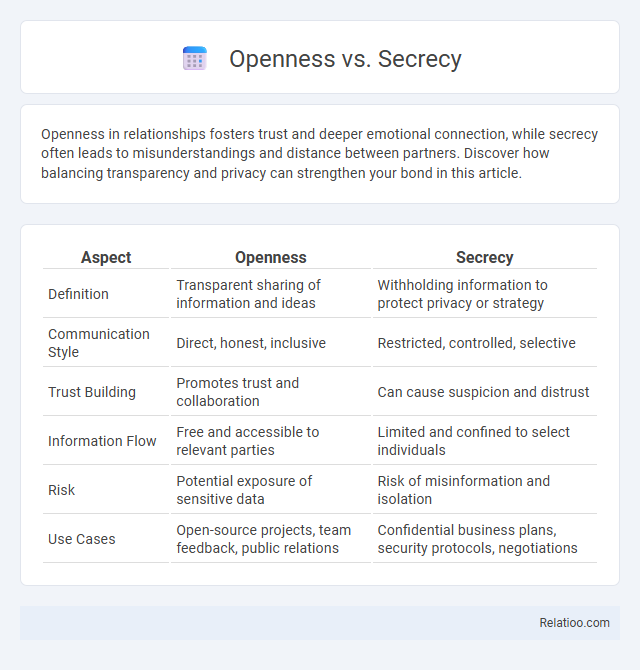Openness in relationships fosters trust and deeper emotional connection, while secrecy often leads to misunderstandings and distance between partners. Discover how balancing transparency and privacy can strengthen your bond in this article.
Table of Comparison
| Aspect | Openness | Secrecy |
|---|---|---|
| Definition | Transparent sharing of information and ideas | Withholding information to protect privacy or strategy |
| Communication Style | Direct, honest, inclusive | Restricted, controlled, selective |
| Trust Building | Promotes trust and collaboration | Can cause suspicion and distrust |
| Information Flow | Free and accessible to relevant parties | Limited and confined to select individuals |
| Risk | Potential exposure of sensitive data | Risk of misinformation and isolation |
| Use Cases | Open-source projects, team feedback, public relations | Confidential business plans, security protocols, negotiations |
Understanding Openness vs Secrecy
Understanding openness versus secrecy is crucial for balancing transparency and confidentiality in organizations. Openness promotes knowledge sharing, collaboration, and trust, while secrecy safeguards sensitive information and competitive advantage. Striking the right balance enhances innovation and security without compromising organizational integrity.
Historical Perspectives on Transparency
Historical perspectives on transparency reveal a dynamic tension between openness and secrecy, shaping governance and societal trust over centuries. Ancient civilizations such as Athens practiced early forms of openness through public forums and democratic deliberation, while medieval and early modern states often prioritized secrecy to consolidate power and protect state interests. The Enlightenment era marked a significant shift towards transparency, promoting governmental accountability and public access to information as foundations for modern democratic societies.
Benefits of Embracing Openness
Embracing openness cultivates trust and transparency, fostering stronger relationships and collaboration in both personal and professional settings. Your willingness to share information and ideas encourages innovation, accelerates problem-solving, and enhances productivity by inviting diverse perspectives. Openness reduces misunderstandings and increases accountability, creating a more inclusive and adaptive environment crucial for long-term success.
The Value of Secrecy in Society
Secrecy plays a crucial role in protecting sensitive information, maintaining personal privacy, and safeguarding national security. Your ability to control the flow of information ensures trust in confidential relationships and prevents exploitation or harm. In contrast to openness, strategic secrecy supports societal stability by balancing transparency with necessary discretion.
Openness in Government and Politics
Openness in government promotes transparency, accountability, and public trust by ensuring that citizens have access to decision-making processes and information. Your engagement is enhanced when officials share data, legislative activities, and policy intentions openly, reducing corruption and fostering democratic participation. Emphasizing openness supports an informed electorate and strengthens the foundations of democratic governance.
Secrecy in Business and Innovation
Secrecy in business safeguards proprietary information, protects competitive advantages, and prevents intellectual property theft, crucial for innovation-driven industries. Maintaining confidentiality ensures your trade secrets and research developments remain secure, fostering a controlled environment for breakthrough ideas. However, balancing secrecy with selective openness can accelerate collaboration while preserving core innovations.
Psychological Impacts of Transparency
Transparency fosters trust and reduces anxiety by promoting openness in communication, which Your team perceives as psychological safety. Excessive secrecy, conversely, breeds suspicion, stress, and disengagement, impairing mental well-being and collaboration. Balanced openness enables informed decision-making and emotional resilience, strengthening organizational culture and individual satisfaction.
Ethical Dilemmas: When to Reveal or Conceal
Ethical dilemmas surrounding openness versus secrecy often hinge on balancing transparency with privacy, where revealing information can promote trust but may also risk harm or breach confidentiality. In fields like journalism, healthcare, and corporate governance, discerning when to disclose sensitive data requires careful consideration of potential consequences, stakeholder rights, and societal impact. The challenge lies in finding ethical frameworks that justify either openness or concealment without undermining accountability or individual rights.
Finding the Balance: Strategies for Organizations
Finding the balance between openness and secrecy is crucial for organizations aiming to foster innovation while protecting sensitive information. Implementing clear data governance policies and role-based access controls can help maintain transparency without compromising security. Your organization can enhance collaboration by promoting open communication channels while safeguarding proprietary knowledge through strategic confidentiality measures.
The Future of Openness and Secrecy
The future of openness and secrecy hinges on the increasing demand for transparency balanced against privacy and security concerns, especially in digital governance and corporate environments. Innovations in blockchain technology and encryption methods enable secure data sharing while preserving confidentiality, reshaping how organizations manage sensitive information. Emerging regulatory frameworks like GDPR and CCPA further influence this dynamic by mandating higher standards for data openness and user consent.

Infographic: Openness vs Secrecy
 relatioo.com
relatioo.com